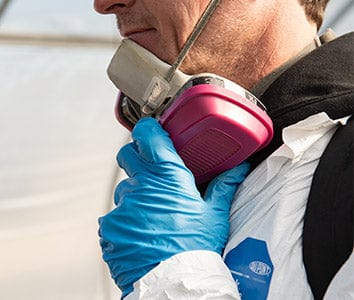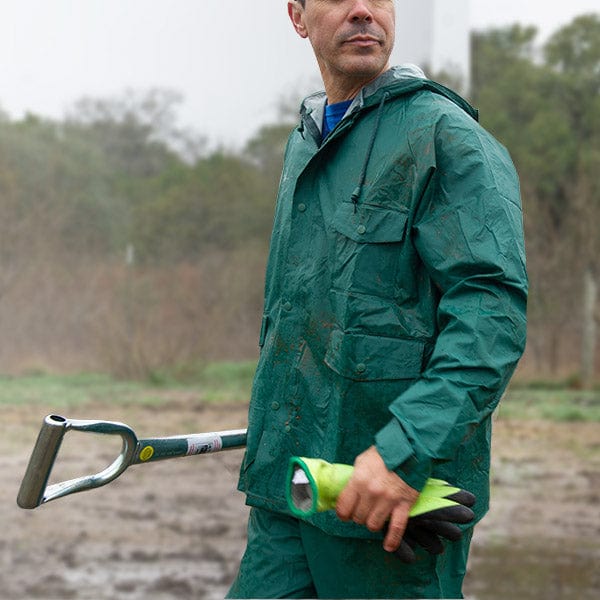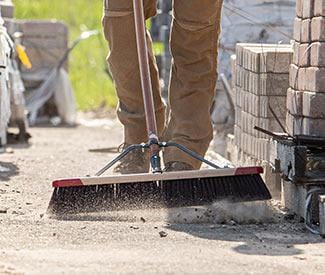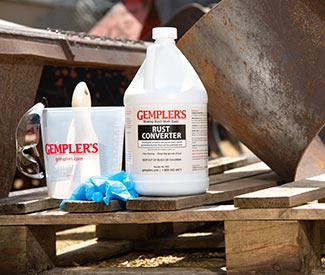Work Safely Around Electricity
Here are some key points.
- Always be on the lookout for electrical hazards.
- Don’t let tall machinery get too close to overhead power lines.
- Be prepared to call for medical help if someone receives an electrical shock.
- Don’t touch a person being shocked until the power is off.
Electricity can be dangerous
- Most of us have received minor electrical shocks at one time or another. Shocks occur when an electrical current travels through your body until it is grounded.
- You are likely to get a shock when you:
- accidentally touch a live wire, or
- come into contact with electrical current passing through a poorly insulated power tool, electrical device or faulty electric cord.
- You are also likely to receive a shock if you plug a cord into an outlet while standing in water or when your hands are wet.
- Other electrical hazards include:
- sparks from electric motors or faulty cords
- fires created by heat from overloaded circuits
- explosions resulting from overheated equipment stored in an area with flammable liquids, vapors or dusts
- burns, which may occur when you accidentally touch overheated wires or electrically operated equipment
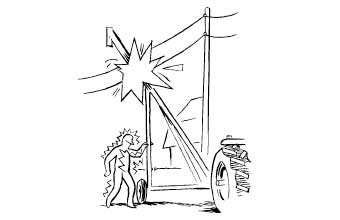
Don’t let tall machinery get too close to overhead power lines.
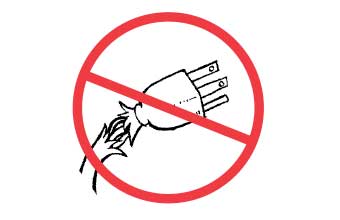
Be on the lookout for frayed electric cords and loose electrical connections.
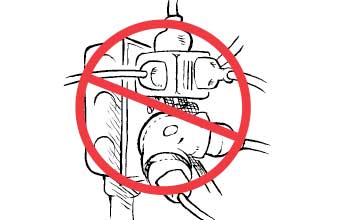
Don’t overload electrical outlets.
How to protect yourself
- Be on the constant lookout for these hazards:
- frayed electric cords
- loose electrical connections
- wires or cords in areas where people walk
- low overhead power line clearances when operating such equipment as portable augers or loaders
- equipment or tools that smell, smoke or spark
- household-grade extension cords used to operate heavy machinery
- overloaded circuits
- ungrounded equipment or wires
- missing covers on equipment or boxes
Here are some more safety tips
- Always check the clearance of overhead power lines when working outdoors on a ladder or with certain equipment such as a front-end loader, fold-up cultivator or auger. Warning: Don’t use a metal ladder around electric power lines.
- Never overload outlets or circuits.
- Be sure the equipment you operate is grounded or double insulated. Three-pronged plugs such as this are used to ground electrical equipment.
- Never use a damaged extension cord.
- If an extension cord is needed to operate power tools or heavy equipment, use a heavy duty cord. Use weatherproof extension cords outside. Cords with built-in ground fault circuit interrupters are recommended for any potentially wet locations.
- Keep your work area clean. Especially be on the lookout for oily rags, papers, sawdust or other materials that can easily burn.
- Don’t perform electrical repairs yourself. Leave that to properly trained technicians.
- Don’t lay cords in the aisles or road where they can be walked on or run over.
What to do in an emergency
- In cases of electrical shock:
- If you can do it safely, shut the power off.
- If you can’t shut the power off and you need to move the person away from a wire, use a long wooden object – not your hands.
- Immediately call for medical help.
- If your tractor comes into contact with an overhead power line, jump off. Get as far away from it as possible. Don’t touch the tractor and the ground at the same time and don’t get back on the tractor.
Electrical Safety Do’s and Don’ts
Do
- Make sure the electrical equipment you operate is grounded.
- Inspect electrical cords before each use.
- Check the clearance of overhead power lines when operating tall machinery or working on a ladder outdoors.
- Ever touch a downed power line.
- Overload circuits or put anything but an electric plug into an outlet.
- Use a household-grade extension cord to operate power tools or heavy equipment.
When you’re ready to work safely, you’re ready to work. See our full line of safety supplies, including respirators, eye and ear protection, coveralls, first aid and more.

